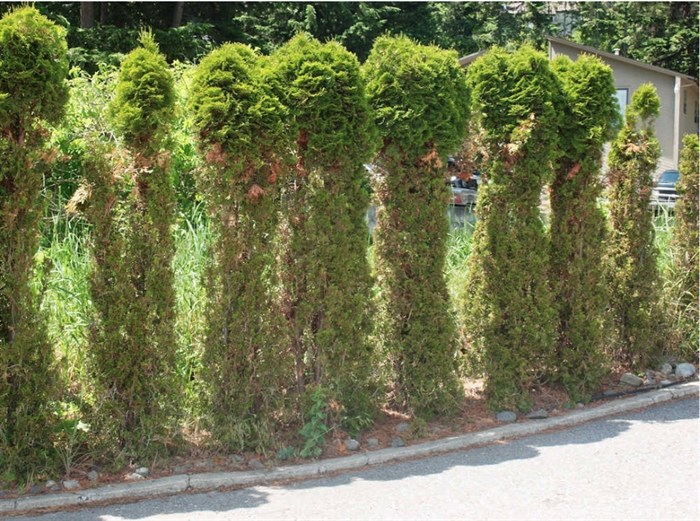Lake Country mayor declares war on... cedar hedges?
Cedar hedges are a popular landscaping choice because they’re green and grow fast and tall to replace ugly fences and avoid more costly landscaping.
But they don’t belong in the Okanagan, the mayor of Lake Country says, and if he gets his way, there will be no new cedar hedges in town.They’re highly flammable and take far more than their fair share of water in a dry climate.
“It’s an effort to react to what just happened. The fire just happened: What are we doing?” Blair Ireland, Mayor of the District of Lake Country says. “Cedar hedges are like having a gun pointed at your house during the fires and it threatens the people who live there, and the neighbours and it threatens the firefighters.”
He’s proposing to his council that they ban any new cedar hedges
Mathieu Bourbonnais, assistant professor of Earth, Environmental and Geographic Sciences at UBCO, agrees they aren’t safe for fire and are terrible water wasters.
“Cedars lose a ton of needles, so the inside of a cedar hedge will be full of dead needles right through the branches at the top, all the way down to the bottom of the hedge, and so when we have fires, what happens with fires impacting homes, isn’t actually the actual flames, it’s embers and debris that is kind of carried in the wind ahead of the fire that gets caught in cedar hedges or on roofs or gutters full of debris and those catch on fire. Another issue with cedar hedges is that we tend to plant them in rows so it’s kind of a fuel that if a fire caught into it, it would spread really rapidly.”
Part of fire-smarting a property is to keep plants well-hydrated, but cedars require enormous amounts of water. Bourbonnais says they just don’t belong in this environment.
“It’s kind of like a no-brainer. Why would we use those going forward in landscaping?”
The Okanagan is also in a level-five drought, one of the worst in years, says Corinne Jackson from the Okanagan Basin Water Board.
“If we do not see the recharge of water in our snowpacks and lakes and reservoirs through the winter we’re going to be in a seriously bad situation next year,” she says. “If there isn’t enough water in the streams for fish and there isn’t enough water in the ecosystem, then that means everyone is hurt. Cedars just do not make sense.”
Mayor Ireland said he hopes this will influence residents towards a more responsible type of landscaping, perhaps using more appropriate desert plants that use far less water, known as xeriscaping. Find out more on the Make Water Work website here. https://www.makewaterwork.ca/
Make Water Work is also running a contest until Sept. 29, 2023, where residents planting smarter plants can be entered to win one of two $500 prizes, and they aren’t the only ones encouraging this type of action. The Regional District of Central Okanagan has a rebate program up to $500 to people who will fire-smart their properties and the City of Kelowna has its NeighbourWoods discount on trees to enhance the urban canopy of the city, and also has rebates on plants and on irrigation controllers.
To contact a reporter for this story, email Gabrielle Adams or call (250) 863-7592 or email the editor. You can also submit photos, videos or news tips to the newsroom and be entered to win a monthly prize draw.
We welcome your comments and opinions on our stories but play nice. We won't censor or delete comments unless they contain off-topic statements or links, unnecessary vulgarity, false facts, spam or obviously fake profiles. If you have any concerns about what you see in comments, email the editor in the link above. SUBSCRIBE to our awesome newsletter here.




